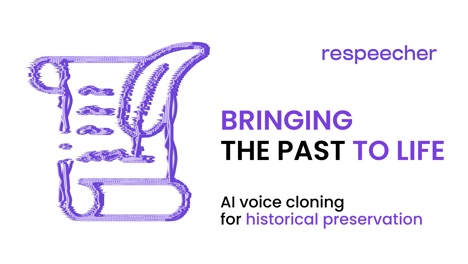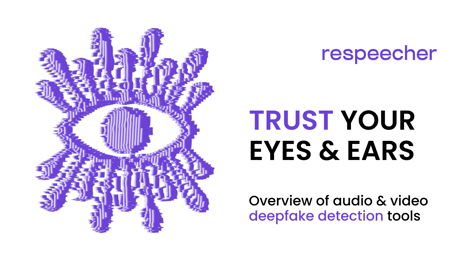AI Voices and the Future of Speech-Based Applications

While the pandemic slowed down the development of businesses and entire industries, it did not affect the ongoing development of AI-generated speech. According to analysts at Meticulous Research, the global voice technology market is growing at 17.2% annually. By 2025 its volume is expected to reach $26.8 billion.
What makes AI voice synthesis such a rapidly developing niche, and what impact is that development having on speech-based applications today?
Examples of speech-based applications
Implementing speech-based applications helps businesses significantly improve customer experiences. Human-like voices that help your clients better navigate your product, solve problems, and get answers to questions, create a much warmer and higher degree of customer loyalty towards a business’s brand.
Today, almost everyone is familiar with, or has had some experience with voice assistants. These are artificial intelligence-based services that recognize human speech and perform a specific action in response to a voice command. Voice assistants are often used in smartphones, smart speakers, and web browsers. The development of AI voice generators has revolutionized the capabilities of these voice assistants, enabling them to produce more natural and lifelike speech, thereby enhancing the overall user experience.
The diverse functionality of voice assistants has grown to cover use cases such as:
- conducting dialogs
- delivering quick answers to user questions
- calling a taxi
- making routine calls
- laying routes
- placing orders in an online store
And many more.
Since all voice assistants operate through the use of artificial intelligence when communicating with users, they have to consider a user’s location, time of day and day of the week, their search history and previous orders in the online store, and so on.
With the help of AI generated voices, you don’t need to hire an actor to make your voice assistant sound natural. All you need is an hour-long audio recording of the human voice you want to vocalize your virtual assistant.
Respeecher built an audio version of the super resolution algorithm to deliver the highest resolution audio across the board, even if you don’t have high-res sources available. But how r resolutionrks and how you can benefit from it, you may wonder. Download this whitepaper on increasing audio resolution with Respeecher to find out.
Voice synthesis software feeds this recording into the machine learning algorithms. So long as the originally recorded speech contains the required number of emotional highs and lows, the synthetic model will be accurate and human-like. AI speakers, equipped with such advanced synthesis capabilities, can effectively mimic human emotions and intonations, enhancing their ability to engage and interact with users on a more personal level. On the Respeecher FAQ page, you will find answers to questions about the voice cloning process
A voice assistant uses dynamic content to generate speech. This means that it adapts to the changing conditions that trigger it. Recordings you hear in an airport, weather alerts, navigations, stock quote updates, etc., are examples of dynamic content.
You wouldn’t hire a live announcer for these types of voice information since doing so would be very costly and unreliable.
Respectively, synthetic speech can help you omit expensive investments while streamlining the process of generating necessary alerts. Widely-used voice bots, powered by speech synthesis, help companies talk to their clients in their native language.
Another type of audio content that can be streamlined with the help of AI voices is the static type. Static audio content does not change depending on context. Radio commercials, podcast interviews, character voices in an animated movie or video game, etc., are examples of static speech-based applications.
In these cases, voice cloning helps to vocalize the necessary pieces of content without having to depend on actors.
How speech-based applications are changing
As with any generative AI technology, speech-based applications evolve to make the user experience even more intuitive and beneficial for the people who use them. Integrating advancements like the voice over generator enhances the versatility and realism of AI-generated speech, opening up new possibilities for applications ranging from virtual assistants to entertainment media.
Conversational UX
A new technological wave of changes in interfaces affects human interaction with computers, forming new habits and requirements for communication with users. The same is happening with conversational UX. Very soon, it will complement familiar interfaces almost everywhere we interact digitally.
As conversational technologies evolve, their use in business communications between the clients and the companies — in natural language — will continue to grow. For instance, conversational UX will be used by support teams for enterprises and by administrators and office managers in SMBs.
Mobile applications
The voice interface is quickly becoming the next big frontier for mobile application development. A survey conducted by Voicebot found that more than 45% of US users would like to see voice assistants in their favorite applications.
Voice assistants inside mobile apps help users operate smartphone applications more natively by leveraging advanced AI voice generators for enhanced user interaction. For example, “Siri, show me the way to the nearest ATM.”
Natural speech
Machine learning technologies and GPU power continue to develop: today, technologies already make it possible to imitate the voice and speech of the speaker much more naturally than before, reproducing the emotions, tone, and individual characteristics of the original source’s speech.
Even though most of your customers know that the voice they’re hearing via their phones is robotic, nobody wants to listen to a dry, lifeless voice. Incorporating a voice over generator enhances the realism and expressiveness of AI-generated voices, offering a more engaging and enjoyable user experience, particularly when implemented in AI speakers.
More and more synthetic voice companies are making progress towards achieving a more natural-sounding rom a human. Learn about how Respeecher helps companies achieve human-like voices for their projects.
How does Respeecher contribute to the development of speech-based applications?
Respeecher uses advanced artificial intelligence and machine learning to master every aspect of your target voice. We combine classical digital signal processing algorithms with proprietary deep-generative modeling techniques. The result is a computer-generated voice that’s nearly indistinguishable from natural speech.
Respeecher contributes to the future of speech-based application by developing advanced features that most other voice synthesis software lacks:
- We provide users with a quick start option: just provide us with a high-quality recording of the voice you want to replicate to get started.
- From whiny to angry, our system picks up every nuance to produce synthetic recordings that your audience will respond to naturally.
- We provide overseas operators with the ability to communicate with customers in their native language.
- We give your robotic operators a much-needed voice makeover to make them sound human.
Respeecher is for anyone looking to reap the benefits of voice synthesis technology — from office workers to Hollywood movie studios.
Moreover, we understand that AI voice technology can be dangerous in the wrong hands. That’s why we follow a strict code of ethics and back by a robust set of security measures. We seek to ensure that our tech is only used for constructive purposes.
FAQ
AI voice synthesis refers to the use of machine learning algorithms to generate natural speech that mimics human voice patterns. It powers speech-based applications, including voice assistants and AI speakers, enabling more conversational UX with voice cloning and AI-generated content.
Speech-based applications, powered by AI voice synthesis and voice cloning, provide a more interactive and human-like experience. These technologies enhance customer experience by offering personalized, context-aware conversational UX, improving efficiency in tasks like navigation, ordering, and customer support.
Industries like customer service, entertainment, and retail benefit from AI voice synthesis. Voice cloning and speech-based applications enhance customer interaction, providing seamless, natural speech in AI assistants, virtual coaches, and voice over generators in media and customer support.
AI voice synthesis is rapidly advancing due to improvements in machine learning and natural speech capabilities. This progress makes speech-based applications like voice assistants more effective by offering human-like interaction with better voice cloning and dynamic content delivery, greatly enhancing user experience and efficiency.
Glossary
AI Voice Synthesis
Speech-Based Application
Voice Assistants
Voice Cloning
Conversational UX
Voice Over Generator
AI-powered tool that creates natural speech for speech-based applications, enhancing voice assistants, AI speakers, and conversational UX with voice cloning.
Natural Speech Processing
AI Speakers
Devices powered by AI voice synthesis that use natural speech and voice cloning to enhance speech-based applications, voice assistants, and conversational UX.
Text-to-Speech (TTS)
AI-driven technology that converts text into natural speech for speech-based applications, enhancing voice assistants, AI speakers, and conversational UX.
Neural Voice Models
AI technology that uses AI voice synthesis to create natural speech for speech-based applications, improving voice assistants, voice cloning, and conversational UX.
Speech Recognition Technology
AI-driven system that converts spoken language into text, enhancing speech-based applications, voice assistants, and conversational UX with natural speech.
Custom Voice Cloning
AI-powered technology that replicates unique voices for speech-based applications, voice assistants, and AI speakers, enhancing natural speech and conversational UX.
Real-Time Voice Synthesis
AI technology that generates natural speech instantly for speech-based applications, enhancing voice assistants, AI speakers, and conversational UX.
Emotional Speech Synthesis
Audio Super Resolution
AI technology that enhances voice cloning and natural speech in speech-based applications, improving AI speakers, voice assistants, and conversational UX.
Synthetic Voice Personalization
AI-driven voice cloning that tailors natural speech for speech-based applications, enhancing voice assistants, AI speakers, and conversational UX.
Multilingual Speech Synthesis
AI-powered voice synthesis that enables natural speech in multiple languages, enhancing voice assistants, AI speakers, and speech-based applications.
Voice Data Training
The process of feeding data into AI models to improve voice cloning, AI voice synthesis, and speech-based applications, enhancing natural speech and voice assistants.
AI-Powered Customer Support
Using AI voice synthesis and voice assistants to deliver natural speech and conversational UX, enhancing customer service through speech-based applications.
Ethical AI Practices
Ensuring AI voice synthesis and speech-based applications respect privacy, fairness, and transparency, while promoting responsible use of voice cloning and AI speakers.

- voice cloning
- artificial intelligence
- AI voice synthesis
- machine learning
- synthetic speech
- artificial intelligence (AI)
- video games
- synthetic voice
- voice cloning technology,
- speech synthesis
- AI voice
- deepfakes in the workplace
- speech-based applications
- AI voice generator
- generative AI
- customer service
- Respeecher for Business
- voice over generator
- AI speaker





